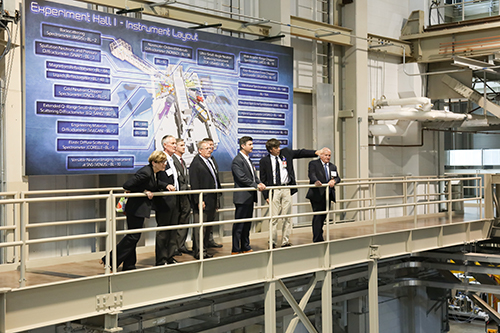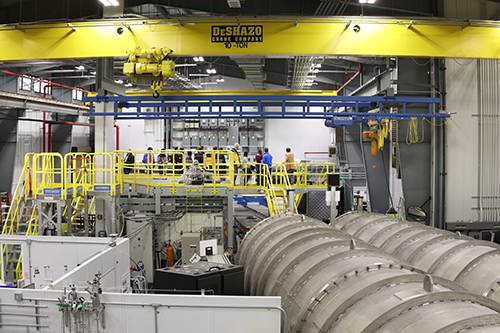Spallation Neutron Source (SNS)
SNS is a one-of-a-kind research facility that provides the most intense pulsed neutron beams in the world for scientific research and industrial development. SNS produces neutrons with an accelerator-based system that delivers short (microsecond) proton pulses to a target/moderator system, where neutrons are produced by a process called spallation. State-of-the-art experiment stations provide a variety of capabilities for researchers across a broad range of disciplines, such as physics, chemistry, materials science, and biology.
With its more intense, brighter source of neutrons and world-class instrumentation, SNS provides the neutron scattering community with unprecedented research opportunities. SNS allows for measurements of greater sensitivity, higher speed, higher resolution, and in more complex sample environments than have been possible at existing neutron facilities.
SNS is available to researchers from all over the world with varying degrees of experience. Submitted research proposals are reviewed by independent scientists from within the neutron scattering community, and the most promising ones are chosen.
High Flux Isotope Reactor (HFIR)
Operating at 85 MW, HFIR is the highest flux reactor-based source of neutrons for research in the United States, and it provides one of the highest steady-state neutron fluxes of any research reactor in the world. The thermal and cold neutrons produced by HFIR are used to study physics, chemistry, materials science, engineering, and biology. The intense neutron flux, constant power density, and constant-length fuel cycles are used by more than 500 researchers each year for neutron scattering research into the fundamental properties of condensed matter.
The neutron scattering research facilities at HFIR contain a world-class collection of instruments used for fundamental and applied research on the structure and dynamics of matter. HFIR is also used for medical, industrial, and research isotope production; research on severe neutron damage to materials; and neutron activation analysis to examine trace elements in the environment. Additionally, the building houses a gamma irradiation facility that uses spent fuel assemblies and is capable of providing high gamma doses for studies of the effects of radiation on materials.



